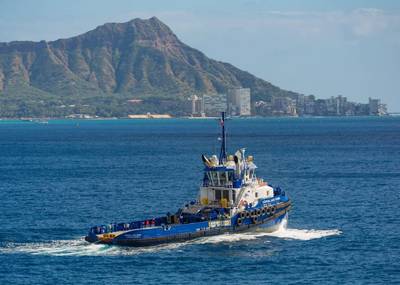Fuel Savings Are Just a ‘Nudge’ Away
The commercial maritime industry is hard at work developing, testing and implementing new and innovative technologies to limit its environmental impacts. While much of the effort has focused on physical solutions such as improved hull design, cleaner burning engines and alternative fuels—all of which are important components of the industry’s decarbonization journey—software firm Signol has its sights set on helping vessel owners and operators reap the rewards of behavioral efficiencies.
The U.K.-based company has developed a solution that leverages big data and behavioral science best practices to “nudge” captains to operate their vessels more efficiently, reducing fuel consumption, operating costs and emissions. Signol has been moving into maritime after its start in the aviation industry, saving Virgin Atlantic more than $6 million in fuel costs and 24,000 metric tons of CO2 emissions during an eight-month trial.
Young Brothers, a tug and barge carrier that transports ocean cargo between the Hawaiian Islands, recently trialed Signol’s software during a first-of-its-kind pilot program partly sponsored by Elemental Excelerator, the Honolulu-based climate tech accelerator and investor. The five-month trial ran from June to October 202, marking Signol’s first for tugs following successful test runs aboard larger ships such as tankers, bulker carriers and containerships.
Signol went live on six Young Brothers tugs and had 24 participating captains and engineers throughout the program. Enrolled captains received personalized goals, motivational reports on their performance and impromptu notifications via email. They were also given access to the Signol web app, where they could review and reflect upon their own individual performance.
“Signol recognizes that captains of tugboats are experts in their field, where they understand their vessels and the ways it operates above everyone else. Signol nudges on the resultant fuel savings from actions giving captains and engineers the motivation to make the adjustments,” a company spokesperson told Marine News. “During the trial, Signol also nudged port managers on departure time ensuring that tug barges were leaving on time, reducing the pressure on the captains during the voyage.”
Achieved savings were significant. During the period Signol was in use, fuel consumption was reduced by 39,000 gallons compared to similar journeys made in the previous year – a reduction of approximately 5.45%, or equivalent to avoiding the emission of 478 metric tons of CO2. The results were calculated by analyzing specific weather-adjusted vessel performance, cargo weight and voyage route to reach a comparison of fuel consumption for each tug-voyage combination year-on-year. The vast majority of captains involved in the trial improved their performance, with the most significant gains coming from those toward the bottom of the historic performance bell curve, Signol said. Marking another sign of success, Young Brothers plans to continue utilizing the program, the company added.
As a nudge technology, Signol’s a human-centered solution specializes in workforce communications. The company describes its user experience as friendly, positive and engaging. “We are able to set personalized, data-driven goals and communicate proactively and effectively by employing behavioral change methods. Captains can then review and reflect upon their performance at regular times, then act upon their targets without sacrificing safety,” the spokesperson said. “Signol is continuously optimizing content and timing to motivate each enrolled individual in achieving their carbon saving targets.”














